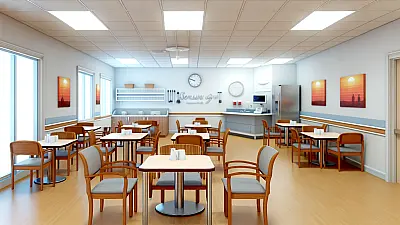GRAND JUNCTION, CO - Eagle Ridge Post Acute nursing facility was cited for serious food safety violations during a June 2024 state inspection, with regulators documenting failures in food preparation, storage, and serving practices that could pose health risks to vulnerable residents.

Critical Food Safety Deficiencies Identified
During the inspection conducted on June 12, 2024, state surveyors found multiple violations related to food sanitation standards at the 2425 Teller Avenue facility. The primary citation involved the facility's failure to prepare, store, and serve food in a sanitary manner, representing a significant concern for resident health and safety.
Food safety violations in nursing homes are particularly serious because residents often have compromised immune systems, making them more susceptible to foodborne illnesses. The elderly population served by these facilities typically faces increased vulnerability to infections and complications from contaminated food sources.
Understanding the Health Implications
Proper food handling protocols are essential in healthcare settings to prevent outbreaks of foodborne illness. When facilities fail to maintain sanitary food preparation and storage standards, residents face elevated risks of gastrointestinal infections, dehydration, and other serious complications that can be life-threatening for frail elderly individuals.
Standard food safety protocols require maintaining proper temperatures for food storage, ensuring clean preparation surfaces, following proper handwashing procedures, and implementing appropriate food storage methods to prevent cross-contamination. These measures become even more critical in congregate living settings where a single contamination incident can affect multiple vulnerable individuals.
Regulatory Standards and Best Practices
Federal regulations require nursing facilities to maintain food service operations that meet professional standards for sanitation and safety. These regulations mandate that facilities establish comprehensive food safety programs that include proper temperature controls, sanitary food handling procedures, and regular monitoring of food preparation areas.
Best practices in nursing home food service include implementing Hazard Analysis and Critical Control Points (HACCP) systems, which systematically identify potential contamination risks and establish control measures at each step of food preparation and service. Staff training on proper food handling techniques and regular monitoring of compliance with safety protocols are also essential components of effective food safety programs.
Impact on Resident Care Quality
Food safety violations can significantly impact the overall quality of care provided to nursing home residents. Beyond the immediate health risks, these deficiencies often indicate broader challenges with staff training, supervision, and quality assurance systems within the facility.
Residents in nursing facilities depend entirely on the institution for their nutritional needs, making proper food safety practices a fundamental aspect of care. When these systems fail, residents may experience reduced appetite due to concerns about food quality, leading to nutritional deficiencies that can compound existing health conditions.
Industry Standards for Correction
When food safety violations are identified, facilities must typically implement immediate corrective measures and develop comprehensive plans to prevent recurrence. This process often involves retraining food service staff, updating policies and procedures, enhancing monitoring systems, and potentially upgrading equipment or facilities to meet safety standards.
Successful remediation typically requires facility administrators to conduct thorough assessments of their food service operations, identify root causes of the violations, and implement systematic improvements to ensure ongoing compliance with safety requirements.
Additional Issues Identified
The inspection also resulted in a cross-reference citation (F867), indicating that the food safety violations may be connected to other compliance issues within the facility. Cross-reference citations typically suggest that multiple regulatory standards were affected by the identified deficiencies.
These interconnected violations often indicate systematic challenges that require comprehensive facility-wide improvements rather than isolated corrective measures. Such situations may prompt increased regulatory oversight and more frequent inspections to ensure adequate progress toward compliance.
The documented violations highlight the ongoing importance of rigorous oversight in nursing home operations, particularly in areas that directly affect resident health and safety. Food service operations represent a critical component of quality care that requires constant attention to safety protocols and regulatory compliance.
Facilities must maintain robust quality assurance programs that include regular internal monitoring, staff training updates, and proactive identification of potential safety risks before they result in regulatory violations or resident harm.
Full Inspection Report
The details above represent a summary of key findings. View the complete inspection report for Eagle Ridge Post Acute from 2024-06-12 including all violations, facility responses, and corrective action plans.
💬 Join the Discussion
Comments are moderated. Please keep discussions respectful and relevant to nursing home care quality.